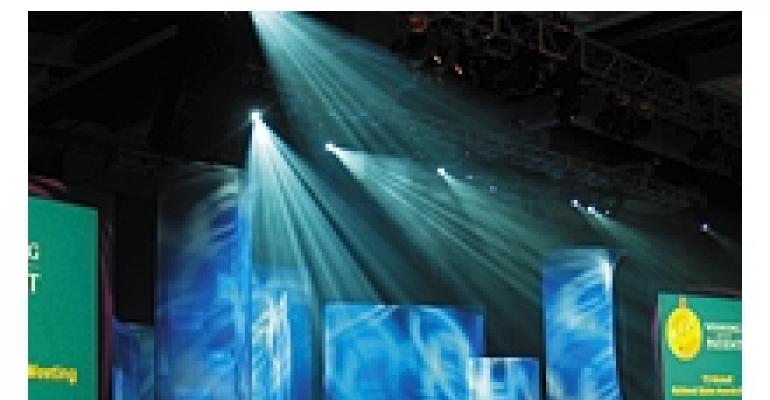YOUR event might have stunning decor, great entertainment and a dynamic speaker. But if the proper technical support isn't in place, attendees will miss out on the full effect of these elements, as you struggle with dim lighting, wimpy sound and mounting expenses.
To ensure a smooth event, heed this advice from technical pros:
- Don't go out alone
The event will benefit, tech pros say, if the planner takes them along starting with the initial site inspection. That way, “you can ensure that any and all technology and equipment needs are addressed from the beginning,” says Julie Cielinski, spokesperson for Tempe, Ariz.-based AV Concepts.
Ajay Patil, head of Halethorpe, Md.-based Showcall Productions, agrees. “A tech partner can provide critical information to an event planner while a site is being selected, so that the event planner is aware of all the limitations and benefits of a particular venue prior to making a recommendation to their client,” he says. “For example, can we fly in this venue? Is power a limiting factor? Likewise, during the conceptual planning stages, a tech partner can provide the planner with a true sense of what kind of costs they should expect from a technical perspective, and how the technical elements can best help them achieve their client's goals and objectives.”
- Let needs — not budget — drive your decisions
Tech pros urge planners to determine what needs to be done before worrying about what it costs. “More often than not, event planners will specify audiovisual equipment based on what is allowed in the budget rather than what will enhance and maximize the experience for the attendees,” Cielinski says. “We serve as audiovisual consultants, fully aware that the success of any meeting or event is based on the audio (can the audience hear what you're saying?), video (can the audience see what you're presenting?) and lighting (can the audience see you?), resulting in a positive experience for the attendees.”
- Ask the experts
Indeed, without expert input from the tech side, the planner may wind up tied to a budget that is unworkable from the start. “Unless the event planner has a strong staging or AV background, there are going to be questions that the end user might need to answer,” says Phil Tucker, senior account executive with the Orlando, Fla., office of AVHQ-Show Solutions. “It is difficult to accurately price an event without a complete understanding of the customer's objectives, expectations and experiences.”
- Don't fence them in
Planners often fail to make the most of their tech partner's expertise. “Many planners sell ideas based on what services they've seen before, or based on what they've seen a vendor do, but the technical company can often provide services greater than what they're being hired for but often get ‘stuck’ behind the planner's vision,” cautions Annette Kevranian of Method 42 Productions in Foster City, Calif. Her new company is the result of a technical production company partnering with a planner. “Planners could produce greater things if they asked questions, learned more about what their technical companies can provide, and collaborated on ideas during the planning stages of their events.”
- Order, order
Although all segments of the event business feel the pressure of ever-tighter turnaround times, slotting tech installations appropriately in regard to other vendors is critical. An example of poor planning, notes David Jacobi, production manager with Culver City, Calif.-based Kinetic Lighting, is scheduling the rental company to lay out tables before production vendors have installed lighting and audio. “Planners should schedule the installation of all ‘flown’ elements — e.g., lighting, audio, video screens, hanging decor — before anything is laid out on the ground,” he advises. “The reverse is true for load-outs. This mistake wastes time and money and makes everyone involved look unprofessional.”
- Get ready for what's next
Technology is putting more features at lower cost into the hands of event planners. “For audio, microphones will get smaller, and processing will become more software-controlled,” Tucker says. “For lighting, LEDs {light-emitting diodes} are the newest technology — they use less electricity, they are cool to the touch, and they can be programmed to change color.” LEDs can also cut costs: “The amount of electricity needed to light an event can be decreased significantly with the use of this power-efficient technology,” notes Kinetic vice president James Shipper. “This translates to smaller generators — and in some cases, no generators.”

As for video, “Wide screen is becoming the technology everyone wants,” Tucker adds. “From display to information, wide screen is a sexy product.”
To keep things moving, “animatronics — or props with mechanical motion or hydraulic shifting — are thought to be beyond most practical budgets,” notes Kevranian. “However, we are able to make these products available and affordable, even for one-time events, and are bringing them to the market for planners to incorporate into their event designs.”
Another big force at work: convergence. “A wide variety of technologies is emerging as lighting and video elements continue to blend,” Patil explains. “Technology such as LED curtains are outdating fiber-optic curtains, and Catalyst technology now features moving light devices that also serve as video projectors, thus exponentially increasing the number of possibilities and options.”
Across the board, tech pros say they want to be full partners in an event's success. “We know it's not just a meeting or event,” Cielinski says. “It is a conveyance of an idea, a time of motivation, a moment of recognition.”
RESOURCES
AV Concepts, 480/557-6021; AVHQ-Show Solutions, 407/541-2416; Kinetic Lighting, 310/837-3204; Method 42 Productions, 650/921-8842; Showcall/BSL Productions, 866/242-6625





